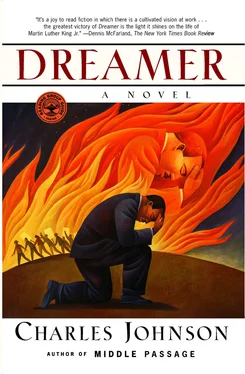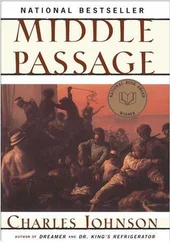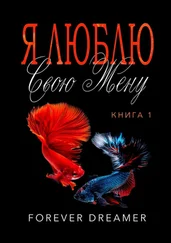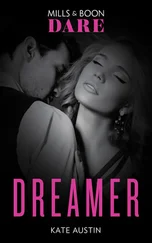“Chaym,” I said one evening. “I’m going back to the city for a while. There’re things I need to do there. Do you think you’ll be okay?”
He gave me a headshake. “Do what you gotta do, Bishop. One thing I’ve always believed, you don’t have to do what anybody else does. Only what you have to do. Ain’t no two people on this planet got the same fuckin’ dharma .”
While I cannot speak with authority on the esoteric subject of dharma, I can tell you that I was on the first Chicago-bound Illinois Central the very next day, sitting almost alone in a big, clanking coach, on a hard, cushionless seat as the endless cornfields whipped by outside the train’s unwashed, thick windows. And because Smith always seemed so obsessed with the story of Adam’s two sons, I sat reading a book on them, one I’d borrowed from the college in Carbondale, while the train chuffed and rumbled upstate. In very little time I was lost in this volume that showed how Cain’s lineage was legion. In the Beowulf poem, Grendel’s mother was his child. Down through history, the tribe of Cainites was identified, variously, as that of blacks or Jews who, I recalled, were forced to wear a “mark” by the Nazis (the color black, of course, was its own mark). But by the time Lord Byron wrote his three-act play on the world’s first murderer and outcast, Cain was beginning to transmogrify from a figure of evil to one of righteous, tragic singularity, and it was Abel — the obedient, unoriginal son — who began to seem flawed and lacking in selfhood. As I read, I trembled, suddenly realizing how ubiquitous Cain, the metaphysical revolutionary, truly was. He was there in so many novels I’d only haphazardly read, from Hesse’s Demian to Steinbeck’s East of Eden, from Miguel Unamuno’s Abel Sánchez to Melville’s Billy Budd, and in numerous films I’d enjoyed, such as Shane (another name for Cain), and The Time Machine, where the Morlocks were descendants of Cain and the Eloi were hapless Abelites (read: dinner). Thinking of another classic Western, The Magnificent Seven, it struck me that the besieged Mexican farmers in that film were Abelites through and through, and the gunmen — the down-and-out murderers — who volunteered to save them were all homeless Cainites on the run (except for one, the young Mexican gunfighter manqué played by Horst Buchholz, who was fleeing from the sterility and boredom of his Abelite roots, but by the movie’s end embraced it for the love of a village woman), with Yul Brynner saying of the farmers in the movie’s last line to Steve McQueen, “We lost. We always lose.”
Slowly, by the time the train reached Champaign, I began to see — as if a veil had lifted — the tortured shadow of Cain everywhere, within me and without, his many cultural reincarnations parading through my mind like frames projected on a cyclorama. He was the first city-builder. Perhaps the father of science and philosophy. His war was with God, the Father who spurned him. Of the two — him and Abel — only Cain possessed subjectivity. A complex inner life. It was said that Western man himself was Cain, cursed with the burden of restlessness and the endless quest for selfhood. Down through the centuries, his name was spelled differently in different times. Caym, Kaym, even Chaym, were etymological variations on it.
When I got off the train, lugging my backpack, I felt strange, a bit like a rootless wanderer myself as I boarded a crowded city bus that passed near my studio apartment on the South Side. Beside me on an empty seat I found another rider’s discarded Sun-Times and tried to read a story about Pablo Picasso’s design for a fifty-foot sculpture planned for the plaza in front of the new Civic Center, but from the rear of the bus, on the backseat, a group of Brillo-haired black boys began cursing and laughing way too loud for the comfort of other passengers. They were swapping tales about white people, each one trying to top the others on whether Jews, southern crackers (or northern whites), or Asians mistreated blacks the worst. And then, as if to remind me how much I’d lost the rhythms of the city while at the Nest, they began to sing:
Jingle bells, shotgun shells,
Freedom all the way,
Oh what fun it is to blast
A trooper man away …
I had not been in Chicago in months. I had forgotten how deeply hatreds ran here. I was out of touch with this big-shouldered, frontierlike city onto which King had futilely tried to graft the transcendent ideals of Gandhi. Although Chicago was nearly fifty percent black, and was first settled by a Haitian black man (Jean-Baptiste Du Sable) who built his cabin on the north bank of the Chicago River in 1772, all the gleaming buildings and skyscrapers I saw as my bus moved through the Loop, all the twenty-story department stores and high-hat restaurants, the smoking factories, stockyards, movie theaters and museums, libraries, playhouses, radio and television stations, amusement parks and stadiums, were owned by white people, as if the Negro was hugely in this Second City but hardly of it. Here, he could be deeply in ward politics, yet where was his economic power, the font from which real politics sprang? Back in the city, I began to feel what Smith called the singular Negro emotion. Envy . It came upon me, like a cold or a summer flu, when I stepped down from the bus and onto the sidewalk two blocks from the building I’d lived in before the riots, as if I’d fallen or been flung into an already finished world, one where people like me would never, ever fit.
At my building on the South Side, I climbed three flights, hoping no one had broken into my place. I walked down the musty hallway past the communal toilet to my studio apartment — one large room attached to a kitchenette — and turned the key in the lock and entered my city-cave. I wanted to call Amy immediately. But when I switched on the light I was staggered by what I saw. The air felt tight, dead. Months had passed since I’d seen this room with its lumpy Salvation Army sofa, a coffee table I’d picked up at a church rummage sale, and bookcases constructed from cinder blocks and planks of wood. We’d left so quickly for southern Illinois when King okayed Smith’s training that my studio was exactly as I’d left it. Dishes caked with Chinese takeout were piled in the sink. Roaches scattered along the counter and cabinets. On the floor by my sofa were pamphlets and application forms for Roosevelt and Columbia College, where I’d planned to reapply, if I could only find financial aid. That, I recalled, had pretty much been my life before Smith appeared: shifting constantly between prayer and economic panic, waging a kind of one-man War on Poverty (my own), because for all President Johnson’s promises, and all the ink he’d used signing into law the Civil Rights Act (he went through seventy-two pens), I was always broke. I dropped my backpack inside the door, closed it quietly, and fell onto the sofa, realizing that if anyone had broken into my place, they would have found precious little worth stealing — nothing, that is, unless they hoped to pawn my five-volume set of the Summa Theologica, boxes of notebooks, or my back issues of Mind .
Except for books and a closet of threadbare clothing, I owned nothing. (And even this pitiful studio was a Winter Palace compared with many places where blacks lived.) I wondered: if the minister was right in saying we must not think about what we might get but rather what we might give in a relationship, then what in this world could I offer Amy Griffith? How could I serve her ? Looking around this room, I saw what a poor catch I was. Very unhip. An old fuddy-duddy at (now) age twenty-five when American culture in the mid-’60s was becoming so fluid, so polymorphous you could change your identity — reinvent yourself — as easily as you restyled your hair. It was the first truly theatrical decade. A moment when role-playing and how things appeared took primacy over reality (and who, after all, knew what that was anymore?). And me? In this world of flux, I was cursed with a shy, Victorian personality, one Smith’s powerful presence had begun to change when I fell into his orbit; but away from him, back in Chicago in my dismal room, I felt again like a moon unmoored. As a colored man raised in the 1950s, I’d learned the hard way to guard my emotions, particularly when I was around white people. I was stiff and proper. Formal and guided by religious principles almost everyone around me (except for King) regarded as obsolete. On the dance floor I drew a blank. (What the hell was “The Bop” anyway?) In social situations I was easy to lose. Or shout down. I tried to be polite, as my mother had taught me (and the minister urged us to do), by patiently listening closely to other people and letting them finish their thoughts, no matter how long that might take, but most often they cut me off or interrupted me in midsentence since I was not an imposing presence and I often quoted from literature or philosophy to reinforce my point, so what I usually had to say went unfinished until I reached home and pulled out my journal and, in the privacy of my studio, completed my end of the conversation there. Hadn’t Amy once told me that in a movie I’d make a good prop? That together the best we would ever create was mud ? Slowly it dawned on me that perhaps her postcards of the last few months were not declarations returning the love I felt for her, but simply examples of her kindness, the sort Amy might show to anyone she pitied.
Читать дальше












